Canadian federal election update : September 11
Sep 11th, 2009 | By Counterweights Editors | Category: Ottawa Scene
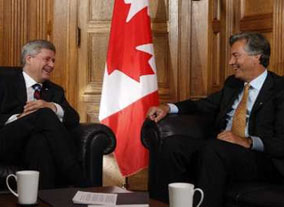
“Canada's Prime Minister Stephen Harper (L) shares a laugh with former Manitoba Premier Gary Doer during a meeting in Harper's office on Parliament Hill in Ottawa August 28, 2009. Conservative Prime Minister Stephen Harper has appointed Doer, a member of the left-leaning New Democratic Party, as Canada's ambassador to the United States.” (REUTERS/Chris Wattie).
It is still not altogether clear that there will actually be a Canadian federal election this fall. But two contradictory trends have developed over the past few days, as all who are still interested await the return of Parliament on Monday, September 14.
First, among those closest to the ground in Ottawa there appears to be a growing conviction that, whatever else may or may not be true, an election this fall is inevitable – and probably sooner than later. See, e.g.: “Bloc ‘convinced’ of fall election, prepares two-pronged ads on rival” ; “Campagne électorale – L’adversaire du Bloc aura deux têtes” ; “Opposition vows to force election” ; and “Opposition dancing to election tune.”
Second, two new opinion polls have confirmed that a quite decisive majority of Canadians are still saying they don’t want to have another federal election this fall. And Jeff Walker, a senior vice-president at the Harris-Decima polling firm, believes the results here are “a little bit different than the typical ‘I don’t want an election’ that we hear often.”
As suggested earlier this week by the Strategic Counsel, the two latest polls also confirm that the Conservatives have moved a few points ahead of the Liberals, while still “remaining several points shy of what they would likely need to form a majority government.”
1. EKOS-CBC poll, September 2—8
Last week the weekly EKOS-CBC survey found the Conservatives and Liberals neck-and-neck. Canada-wide, for the period September 2—8, this survey now finds Conservatives 34.2%, Liberals 30.8%, New Democrats 14.8%, Green Party 10.1%, and Bloc Quebecois 10.0%. On election timing goes, EKOS also finds only 28% prefers this fall, while 72% “prefers sometime later.”
Regionally, this latest EKOS poll finds the Liberals losing some ground in Ontario to the Conservatives, and in Quebec to the BQ. At the same time, the Liberals are now ahead of the New Democrats in BC on this reading and ahead of the Conservatives in the Ottawa city region. EKOS is reporting as well: “Besides region, perhaps the most important overall predictor of Conservative support is now age … The Conservatives are essentially tied with the Liberals for first place among voters under the age of 25, and lag behind them among voters 26-44. However, as you move up to older age groups, Conservative fortunes rise dramatically.”
2. Harris-Decima poll, August 27—September 6
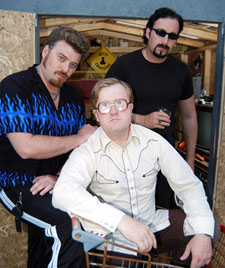
Younger Canadians are somewhat more in favour of an election this fall. But all told about three-quarters of all Canadians are telling pollsters they don't want one.
A Harris-Decima poll for the Canadian Press, for the period August 27—September 6, suggests quite similar results. Canada-wide it has Conservatives 34%, Liberals 31%, New Democrats 15%, Green Party 10%, Bloc Quebecois 8%. On election timing here an “overwhelming 73% said an election is not needed this fall; only 21% thought it necessary.”
Regionally, Harris-Decima still has the Liberals ahead of the Conservatives in Ontario, but suggests the Conservatives have opened up a more substantial lead in BC than EKOS found. Harris-Decima also puts the BQ well ahead of the Liberals in Quebec (36% to 31%), but not by as much as EKOS (39.8% to 27.8%).
Harris-Decima has further data on at least two more intriguing issues. First: “50 per cent of respondents thought the Liberal Leader was wrong to declare his party will no longer prop up Stephen Harper’s minority Conservative government. Only 38 per cent thought he was right.” Many seem to be reading this as evidence that (as a Globe and Mail headline put it): “Ignatieff’s support slips on sabre-rattling.” But will the picture change, as voters learn more about the current turmoil in Ottawa during a full-blown election campaign?
Second : “If there is a fall election campaign, Mr. Harper and the Tories have signalled they intend to raise the spectre of Mr. Ignatieff reforging a coalition with the NDP and Bloc to form government. Ignatieff’s predecessor, Stéphane Dion, tried the coalition ploy last November, sparking a massive public backlash … But the [Harris-Decima] poll suggests the coalition idea isn’t necessarily the bogeyman Tories think it is; there are circumstances in which most Canadians would support it … If the next election results in a minority, 55 per cent said the leading partner should seek out a coalition partner to extend the life of the Parliament.”
3. Who started out on top of the polls in 1993?
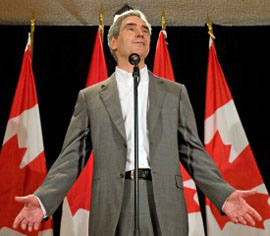
Liberal Leader Michael Ignatieff speaks to reporters on the final day of the party's summer caucus retreat in Sudbury on Sept 2, 2009. The Canadian Press.
Liberal strategist Warren Kinsella has been stressing on his always interesting website that the Liberals started out the 1993 campaign somewhat behind the Conservatives, but went on to win a solid Liberal majority government in Parliament, with just over 41% of the Canada-wide popular vote.
Mr. Kinsella is not stressing, however, that in 1993 today’s Conservative Party of Canada – what he himself nicely calls the “Reformatories” – was still divided into Progressive Conservatives and Reformers, or that the Canadian left in 1993 was not even further fractured by a Green Party that can at least take a significant enough chunk of the Canada-wide popular vote.
4. Ignatieff under stress
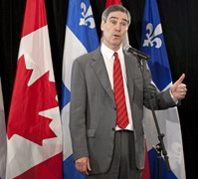
Liberal Leader Michael Ignatieff responds to a question during a news conference in Montreal, Thursday, September 10, 2009. THE CANADIAN PRESS/Paul Chiasson.
The latest polls certainly show that Mr. Ignatieff’s Liberals still have much work to do if they want to reap an even credible harvest from a Canadian federal election this fall.
On the old natural governing party’s current struggles, see, e.g.: “Federal election: Liberals believe they have fighting chance” ; “First time not always charm in politics” ; “An off-putting air of entitlement … Michael Ignatieff is asking Canadians to choose between his party and the alternatives, without presenting any solid reason to make such a choice. He, more than anyone, needs to do better” ; and “Overcoming the ‘just visiting’ image … Ignatieff needs to succeed in addressing voters’ doubts about his commitment to this country … The very fact that Canadians have such thoughts shows just how successful Harper has been in shaping Ignatieff’s image.”
5. Are “socialists and separatists” really that scary in most parts of Canada (as opposed to Alabama, or South Carolina, etc, etc.)?
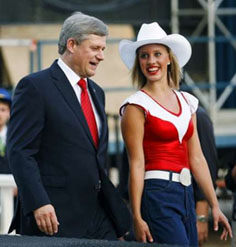
Canadian Prime Minister Stephen Harper is escorted off the stage by a dancer at the opening ceremonies for the World Skills Competition in Calgary, September 1, 2009. REUTERS/Todd Korol.
As noted above, “If there is a fall election campaign, Mr. Harper and the Tories have signalled they intend to raise the spectre of Mr. Ignatieff reforging a coalition with the NDP and Bloc to form government.”
There is now a video tape of Mr. Harper urging this strategy on a Conservative meeting in Sault Ste. Marie, Ontario, saying: “If we do not get a majority, the Liberals, the NDP and the Bloc Québécois will combine and they will form a government. They will deny this till they are blue in the face in an election campaign, but I guarantee it, if we do not win a majority, this country will have a Liberal government propped up by the socialists and the separatists.”
As the Harris-Decima poll above suggests, this could prove a mistaken strategy. (Or not, of course.) There may be many voters in Alberta who are still scared by talk about “socialists and separatists.” But based on our collective conversations in bars and restaurants further east last December, what most irked the great Canadian masses about the late 2008 federal Coalition proposal was that Stephane Dion would have become prime minister, even though his party won not many more than half as many seats as Mr. Harper’s party..
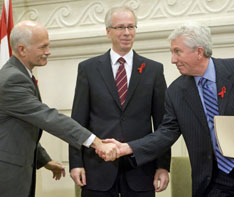
NDP Leader Jack Layton and Bloc leader Gilles Duceppe shake hands as then-Liberal leader Stephane Dion looks on after signing a coalition agreement on Dec. 1, 2008.
A coalition or accord or similar arrangement of some description would only work in 2009, or 2010, on this logic, if Mr. Ignatieff’s Liberals actually manage to win at least a few more seats in Parliament than the Conservatives. And again, they have a lot of ground to gain before that is a serious, realistic prospect. Whether “Iggy” and the current Liberal leadership can rise to the occasion is clearly an open question right now.
He has made some good use of the Sault Ste. Marie video tape (“Video shows two faces of Stephen Harper: rivals”). But has he also thrown the baby out with the bathwater, with such headlines as “Ignatieff rules out coalition with NDP, Bloc … Liberal leader dismisses PM’s warning that Conservatives need a majority”?
Again, see the current Harris-Decima finding above: “If the next election results in a minority, 55 per cent said the leading partner should seek out a coalition partner to extend the life of the Parliament.”
6. Can the Green Party win a seat … again?
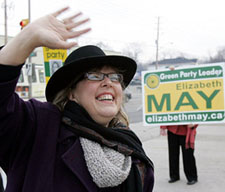
The irrepressible Ms. May: has she made another mistake running against another Conservative cabinet minister (even if she has moved from the Atlantic to the Pacific oceans, just like Canada itself, in the great green days of the multiracial fur trade)?
If there finally is a Canadian federal election this fall, it now seems clear that Green Party leader Elizabeth May will run in the BC riding of Saanich-Gulf Islands.
For further information see: “La longue traversée du Canada … Battue en Nouvelle-Écosse, la chef des verts tentera de se faire élire en Colombie-Britannique” ; “May wants to run against cabinet minister – in BC … Albert Einstein once said the definition of insanity was doing the same thing over and over again and expecting different results, but federal Green party Leader Elizabeth May doesn’t think there’s anything crazy about once again, running against a Conservative cabinet minister in the next election” ; “Saanich-Gulf Islands: 2008 Results by Sub-Region” ; and “Does May have a chance in Saanich – Gulf Islands?”
Our coverage of what may or may not prove to be the Canadian federal election of 2009 was kicked off earlier this week by Dr. L. Frank Bunting’s in-depth report, “Waiting for the next Canadian federal election.”
CLICK HERE for his extended background discussion on such issues as “Are there still serious prospects that Jack Layton or even Gilles Duceppe will still finally keep the Harper government alive, at least until spring 2010?”; “Or will Harper himself finally engineer his own defeat?” ; “Has Ignatieff done the right thing, in any case?” ; and “The Obama factor … and what would be best for Canada, in the very end?”
For an update on Canadian federal politics as of Friday, September 18, 2009, see L. Frank Bunting’s In Brief report: “All fired up and ready to go in Canada?”
For a still further update on the Ottawa scene as of November 9, 2009, see Dr. Bunting’s “Donolo diaries, Byers ceasefire proposal, and Michael Ignatieff, anti-monarchist.”
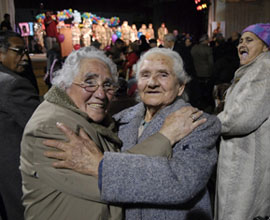


[…] Canadian federal election update : September 11 – Counterweights […]